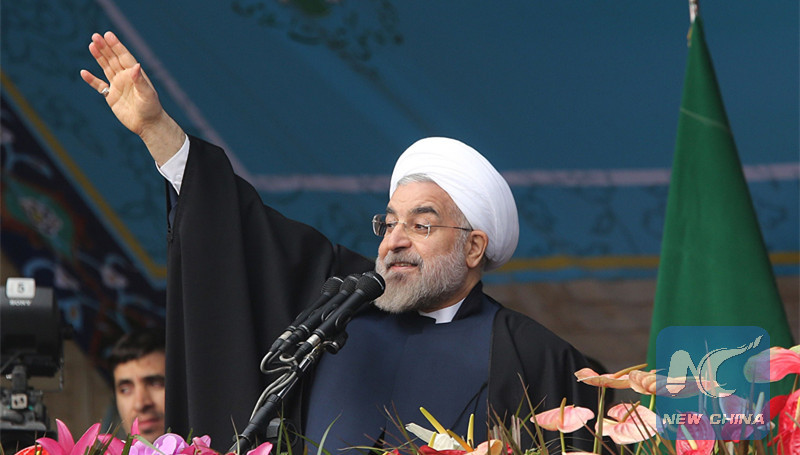
Iranian President Hassan Rouhani waves as he delivers a speech during a rally in Tehran's Azadi Square to mark the 35th anniversary of the Islamic revolution on February 11, 2014. (File photo: AFP)
Iranian President Hassan Rouhani on Sunday warned the United States against any conflict with Iran, saying that US should avoid starting an economic war with the Islamic republic, according to Press TV.
"The Americans should learn very well that peace with Iran is the mother of all peace and war with Iran is the mother of all wars," Rouhani said at a meeting with the Iranian diplomatic missions in foreign countries.
Following US President Donald Trump's decision to quit the historic Iranian nuclear deal on May 8, the US vowed to reimpose sanctions lifted under the accord on Iran and inflict punishment on nations that have business links with the Islamic country.
The White House has announced that it would bring Iran's oil sales down to "zero."
The Iranian officials described the US move as an economic war, said the report.
Rouhani said such threats against Iran would have adverse effects.
"Threats will further unite us," he said, vowing to "certainly" defeat the US.
"That will cause some costs for us, but the benefits will be greater," he added.
He said that the US latest conspiracy has been to attempt to wear the Iranian nation down and lead it into submission.
However, "you must know that the Iranian nation is honorable and will never be servile to anyone," he said.
Rouhani warned that if Iran cannot sell its oil, it would be impossible for other countries in the region to sell their oil.
"No one with even a basic understanding of politics will ever say, 'we will block Iran's oil exports,'" Rouhani said.
"Mr. Trump!... Don't play with the lion's tail! It will be something (for you) to regret," he warned the US against anti-Iran measures.
Besides, Rouhani pointed to the stance of the remaining parties to the JCPOA versus that of the US and said Washington has become isolated as a result of its unilateral withdrawal.
"The US is clashing with the whole world over the JCPOA," he said, adding that "the isolated America should not (be given a chance to) recover."
In the meantime, Iranian Foreign Minister Mohammad Javad Zarif on Sunday called for practical measures by the European parties to the 2015 nuclear deal to save the accord, Tasnim news agency reported.
Zarif pointed to recent talks between Iran and the European parties to the deal, and said that "alongside the statements and pledges they give, the Europeans must act to save this agreement."
"We have not seen sufficient practical measures by the western powers and the remaining parties" to the JCPOA following the US pullout in May 8, he was quoted as saying.
Iran will continue talks with the Europeans, but will not wait too long for them, Zarif said, referring to Europe's resolve to propose a package of economic measures to offset US withdrawal from the JCPOA.
On Friday, a ministerial meeting on the Iran nuclear deal was held in Vienna. The meeting, chaired by Federica Mogherini, EU's high representative for foreign affairs and security policy, was attended at ministerial level by China, France, Germany, Russia, Britain and Iran.
The measures would collectively cause difficulties for Europe to maintain trade ties with Iran. Nevertheless, Europe, Russia and China have decided to explore ways to maintain the JCPOA and trade with Iran.
On Sunday, Iran's Parliament Speaker Ali Larijani said that European countries must endeavor to implement the nuclear agreement in the best possible manner.
"Europe must present its approach and plans for the full implementation of the JCPOA," Larijani was quoted as saying by Press TV.
The JCPOA, sealed in July 2015, restricts Iran's nuclear activities in exchange for the easing of sanctions on the Islamic republic.
Trump has urged the International Atomic Energy Agency to widen its inspections on Iran's military sites after his decision to quit the deal. The demands have been rejected by Iran.


